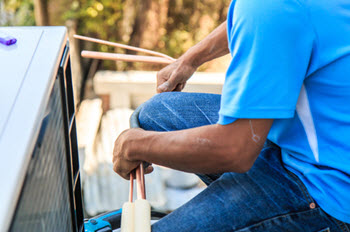Contents
- 1 Spring and Summer Energy Saving Tips For Your Home
- 1.1 1. Seal Any Cracks To Avoid Air Leaks
- 1.2 2. Maintain AC Efficiency With Regular Tune-Ups
- 1.3 3. Keep The Thermostat At A High But Comfortable Setting
- 1.4 4. Go Natural When Possible
- 1.5 5. Clean The Refrigerator For Energy Efficient Operation
- 1.6 6. Consider Energy-Efficient Appliance Replacements
- 1.7 7. Cook Outdoors Or With A Microwave
- 1.8 Cal Wilcox Energy For All Of Your HVAC Needs
 Spring is always a welcome sight to behold for anybody. The plants spring back to life, flowers bloom, and everything else comes back with colors so vivid to the eyes. People shred thick clothing in exchange for more suitable outfits to fit the new season. These are the positive changes that come about after the cold winter months.
Spring is always a welcome sight to behold for anybody. The plants spring back to life, flowers bloom, and everything else comes back with colors so vivid to the eyes. People shred thick clothing in exchange for more suitable outfits to fit the new season. These are the positive changes that come about after the cold winter months.
Nevertheless, the springtime gives way to a hot summer season; a time when people have to rely again on the air conditioner to keep their homes conveniently cooler. It is essential to feel comfortable indoors, but no one is happy with the increased energy bill that comes along with it.
Spring and Summer Energy Saving Tips For Your Home
Below are helpful tips you can use to save energy for environmental and financial benefits:
1. Seal Any Cracks To Avoid Air Leaks
Any crack around the perimeter of your home can cause warm air from the outside to enter inside the house. Consequently, this issue requires the AC to work even harder to keep the interior at a comfortably cooler temperature. This situation means more energy consumption and consequently, higher utility bills. Seal any leaks with caulk to prevent this. You may usually find leaks around plumbing vents, wiring holes, windows, doors, and recessed lights.
2. Maintain AC Efficiency With Regular Tune-Ups
As the air conditioner gets clogged with dirt, dust and other debris, the HVAC performance suffers. The cooling system may still work, but it will require more energy to maintain the right indoor temperature. However, you can prevent performance issues by getting regular professional maintenance. Before summer kicks in, have the air conditioning unit tuned-up in preparation for the hotter season.
3. Keep The Thermostat At A High But Comfortable Setting
 Always check the thermostat’s temperature setting. Many people wrongly overestimate their cooling needs and aggressively turn on the thermostat. Keep in mind that making the system work harder than necessary can increase energy bills. Experts usually suggest that a temperature of 78 degrees Fahrenheit is just the right amount of cool to provide you with sufficient indoor comfort without spiking energy bills. Also, you can even go for slightly higher temperatures to save money.
Always check the thermostat’s temperature setting. Many people wrongly overestimate their cooling needs and aggressively turn on the thermostat. Keep in mind that making the system work harder than necessary can increase energy bills. Experts usually suggest that a temperature of 78 degrees Fahrenheit is just the right amount of cool to provide you with sufficient indoor comfort without spiking energy bills. Also, you can even go for slightly higher temperatures to save money.
4. Go Natural When Possible
During springtime, the temperature is usually relatively cool, and you may not even have to turn on the AC. In some areas, it may get hot during the midday and it is okay to turn the AC on until it gets relatively cooler once again. During the night, you can depend on natural ventilation by opening windows. Make sure to close the windows when you need to turn the AC on again.
5. Clean The Refrigerator For Energy Efficient Operation
The fridge, aside from the AC, is another energy-hungry home appliance. To minimize power consumption, optimize the use of this unit as well. Perform a thorough clean-up. Clean the dust and dirt around the coils, remove any unnecessary contents inside, clean the door seals, and regularly defrost the unit to get rid of frozen walls. These tips can help provide better ventilation, allow the doors to close tightly, optimize unit performance, and lessen energy consumption.
6. Consider Energy-Efficient Appliance Replacements
 Consider replacing any old appliance in your home for eco-friendly and energy-saving replacements. Old appliances that continuously need repairs may have to retire and get replaced with newer ones. Furthermore, they consume more energy while operating, spiking up your energy costs.
Consider replacing any old appliance in your home for eco-friendly and energy-saving replacements. Old appliances that continuously need repairs may have to retire and get replaced with newer ones. Furthermore, they consume more energy while operating, spiking up your energy costs.
Newer models of refrigerators, ACs, etc. are designed to be more efficient and reliable. They consume less energy and they perform much better than their predecessors. The initial cost may be high, but overall expenditure over time is lower.
7. Cook Outdoors Or With A Microwave
Cooking requires the need to heat up ingredients. The heat generated by cooking does not stay inside the kitchen. The air will circulate around your home and affect its indoor temperature. If possible, consider alternative methods of cooking like using the microwave or grilling outdoors to lessen the heat circulated inside the home.
Cal Wilcox Energy For All Of Your HVAC Needs
The friendly, NATE-certified, professional HVAC technicians at Wilcox Energy are very capable and skilled to perform various services on your HVAC unit.
You can expect quality service beyond your expectations. We specialize in top-of-the-line HVAC tune-ups, repairs, installations, and other services.
We employ NATE-certified contractors with the necessary training and experience to ensure that your HVAC unit performs efficiently, optimally, and provides quality indoor air. At Wilcox Energy, we guarantee our work to ensure your satisfaction.
Furthermore, we provide competitive prices for all of our HVAC services within the area.
For more information about our HVAC services, be sure to contact Wilcox Energy. You can click here to contact us or you can call us at (860) 399-6218 to find out more. We offer a full line of heating and cooling repairs, maintenance services, and installations.
